Sydney’s biggest names reveal why we are still tuning in after 100 years of commercial radio
‘It’s harder to kill than a cockroach,’ says one of Sydney’s biggest stars Ben Fordham as we go behind the scenes to celebrate 100 years of commercial radio.
Entertainment
Don't miss out on the headlines from Entertainment. Followed categories will be added to My News.
Camaraderie, controversy and the odd traffic delay is what’s kept the commercial radio industry thriving 100 years on and, as its biggest stars say to doubters: “It’s harder to kill than a cockroach.”
For decades, analysts have claimed that radio will be phased out. But with Thursday marking 10 decades of commercial radio, Insider has turned to the biggest names in breakfast to find out why we’re still tuning in after so many years.
With the likes of Alan Jones, Ray Hadley, Kyle Sandilands and Mick Molloy in the game, it’s no surprise breakfast radio, in particular, continues to be plagued by controversy. But that’s a good thing, according to their rivals and breakfast radio personalities Ben Fordham, Amanda Keller and Brendan “Jonesy” Jones, who came together in The Sunday Telegraph studios to mark the centenary milestone this week.
“It is seen as cutthroat, but on the inside, we all love each other,” says WSFM’s Amanda Keller, who has been working in radio for 28 years.
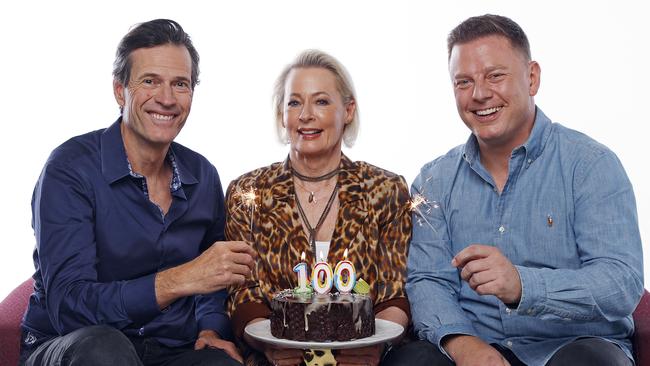
I remember when I first started on radio with Andrew Denton a million years ago, Wendy Harmer was very kind to me and she was in opposition to us.
“She was at Today FM we were at Triple M. She went out of her way to phone me and welcome me to breakfast radio. And she had done the same to Andrew when he joined, and she said, ‘the more interesting people that joined radio, the better it is – the more eyes and ears on radio, the better it is for everybody’ – and I think that’s true. This level of interest in Kyle and Jackie O can sometimes feel overwhelming – but sometimes you go, ‘well, at least people are talking about radio’.”
2GB’s Ben Fordham, who made the switch from TV three years ago, added that the shared burden of gruelling schedules, early mornings and being a big player in one of the most cutthroat industries in the world means most breakfast teams relate to each other.
“In the breakfast shift, in particular, you’ve got sympathy for other people who are doing it,” says Fordham.
“I mean, it’s great, fun, it’s lucrative and it has all sorts of great qualities.
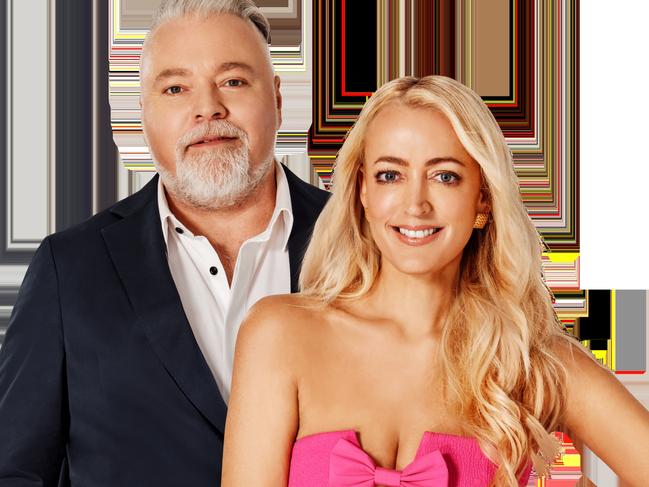
“But there is that element of, we’ve all got that one thing that we share.
“We wake up when it’s dark. In winter, I think that’s really hard. I think (there’s) a degree of loyalty to the other people doing the same shift because it is bloody hard.”
“There’s competition, but we support each other – you don’t want to see another show die …” adds Jones.
“Although if there was one that we wanted to kill off,” he laughs.
“It rhymes with bile and backie O,” replies a contrite Fordham.
Fordham is, of course, referring to powerhouse duo Kyle and Jackie O, who in the radio ratings result this week saw Fordham keeping his spot in second by the thinnest of margins, recording a share of 16.2 per cent to Kyle and Jackie O’s 16.3 per cent.
“Even on those guys, though, we slug it out a little bit and go head to head and bag each other from time to time, but there’s plenty of times I get a message from those guys saying ‘you have done well’.”
All agree camaraderie and healthy competition results in a thriving industry.
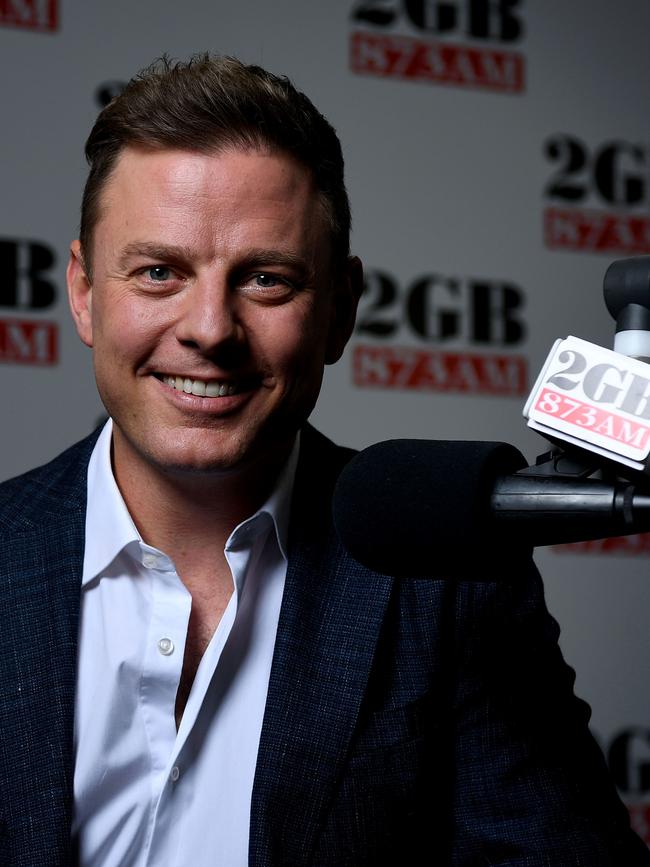
“You know what, Wendy did the same thing to me,” says Fordham.
“When I started in the breakfast shift, she called me on a private number, so I didn’t answer. And then she sent a text saying, ‘Ben, it’s Wendy Harmer, you palooka’.
“So I called her and she just said ‘hey, I know you’ll be nervous, so I’m just wishing the best of luck’. So, of course, when she had a book out recently, I said ‘hey, come into the studio, let’s sell a few books’.”
It’s been a meteoric and swift rise to success for Fordham, who entered the industry at age 15 as a work experience kid on the show he’s now at the helm of. Since taking on what is considered one of the most influential broadcasting slots in the country from Alan Jones in 2020, Fordham is making plenty of headlines. Mostly positive. A few controversial. Most recently involving an incident when he crashed a colleague’s program during an outside broadcast following a long Friday lunch.
“So I had a story to break,” says Fordham.
“So of course I went on his (Chris O’Keefe’s) show. I broke the news and then our boss, Tom Malone, called me and said, ‘mate, you’ve been at lunch,’.
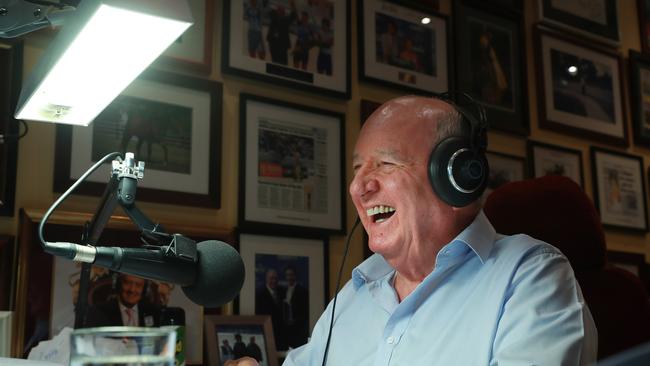
“And I said ‘yeah, how’d you know?’ – and he goes ‘I just heard you on air – you sound pissed’.
“And then Annette Sharp from The Sunday Telegraph got the story.
“I owned up to it.
“But just on how you handle it with your parents – I thought, I know this is coming in the Sunday Telegraph and Mum’s gonna see it so I need to be a man here.
“So I called my little brother and said ‘Nick, can you let mum know?’.”
“You were like Karl at the Logies, without the charm.” interrupts Jones, who spent the morning antagonising both Fordham and his co-host Keller, with whom he admits he has a brother-sister relationship.
One thing is certain, though. Despite having among the most high profile media jobs in the country, Jones, Keller and Fordham put family first. The fact they are all parents means the trio have had to navigated the family-versus-career juggle, with Fordham recounting a story of how he called on ‘The People’s Champion’ to move his radio shift forward so he could attend his daughter’s first day of school.
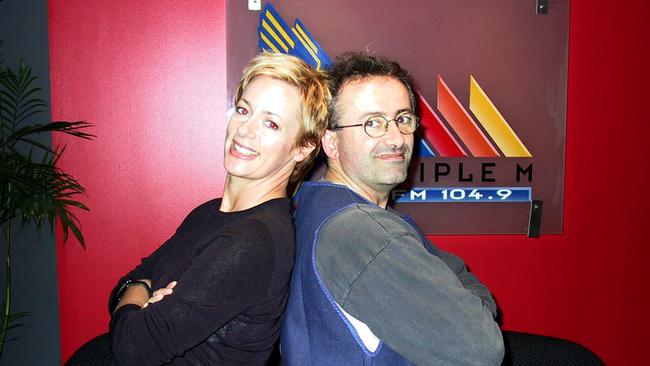
“My daughter, Pearl, her first day of kindergarten – she was like, “you’re going to be there right?’,” Fordham says.
“And I was like, ‘yes, yes’ – but school starts at nine, and my show finishes at nine.
“So on that occasion I called ‘The People’s Champion’, Ray Hadley, and I said, ‘how would you feel about starting your show half an hour early so I can take off’. He loved it. It’s his way of taking over breakfast.”
And while they have all missed the madness of hectic mornings to get offspring ready for the day, they have been able to enjoy quality time in other hours of the day.
“Equally, you have all this time during the day,” says Fordham.
“I have had so much time with my little kids before they were at school, which I would have missed out on if I wasn’t doing breakfast.”
However, one downside of being a father and working in the lucrative breakfast radio slot is when your kids are old enough to Google, according to loveable larrikin Jones.
“Wait until your kid’s Google how much you make,” laughs Jones.
“Whenever I cry poor, they tell me what I allegedly make – but I tell them that has been blown up.”
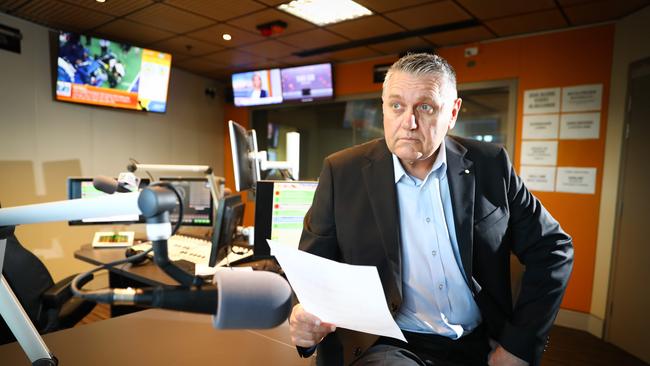
Pay packets are one of the most speculated and contentious topics when it comes to breakfast radio. More often than not it’s radio king and queen Kyle and Jackie O’s salary that comes into question, with recent suggestions they are set to sign a monster $200m radio deal, which would see them remain on-air until 2034. But if you ask Fordham, that’s “absolute rubbish”.
“I can assure you that if you Google it, you will always get the wrong information,” he says.
“I’ll throw Kyle and Jackie O under the bus – the stories about how much Kyle and Jackie O earn is absolutely farcical. They are just made up. Kyle just makes it up, he spreads all this false information about earing squillions … he earns a lot of money, so does Jackie O … but it is rubbish – completely rubbish.”
One thing is for sure – their listeners tune in for a reason. More than 13 million Aussies tune into commercial radio everyday. And while there’s no denying that as digital platforms and streaming services gain prominence, traditional radio finds itself having to navigate and contend with ever-changing consumer preferences, Jones – whose journey in radio began in Karratha in 1990 – says the media platform is here for a long while yet.
“When I started in radio, they brought out a CD stacker and the harbingers of doom said, ‘this is going to kill radio, because it’ll be in the boot of someone’s car and they can put as many CDs as they want in there and they’re not gonna want to listen to you guys anymore’,” he says.
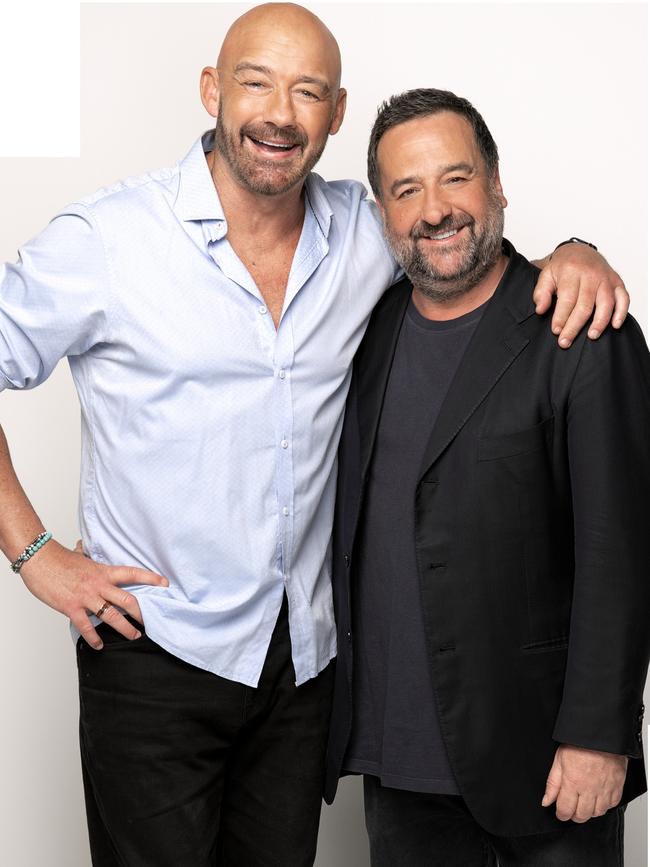
“Then they said Spotify, podcasts, all this stuff is going to kill radio. It won’t. Podcasts are still in its infancy. But I think there’s a big future for the people that provide the content on radio. I think radio will always be there. And I know this is because it’s there if it’s happening right now. A car has a crash, a truck gets stuck on the Galston Gorge. It’s instant connectivity.”
Keller, who in 1995 started her radio career with a highly successful five-year breakfast show on Triple M with Denton before being lured back in 2005 to work alongside Jones, says radio provides both comfort and a voice to listeners. It can be one-on-one and personal with listeners and gives audiences an opportunity to be involved and to be heard.
“I love the emails we get,” says Keller.
“And we’re not always aware of it. You go about doing your show, you are with them on their best days and their worst days, and we take our consistency very seriously.
“I lost my voice last Monday. It’s the first day I’ve had off probably in 18 years. I think it’s so important to be there. Because people tune in wanting your company as much as anything else. And I find that hugely flattering, but I think that’s the importance of radio. People say they feel like they’re our friend and that’s the biggest compliment you can get. That’s what radio gives you that other mediums don’t.”
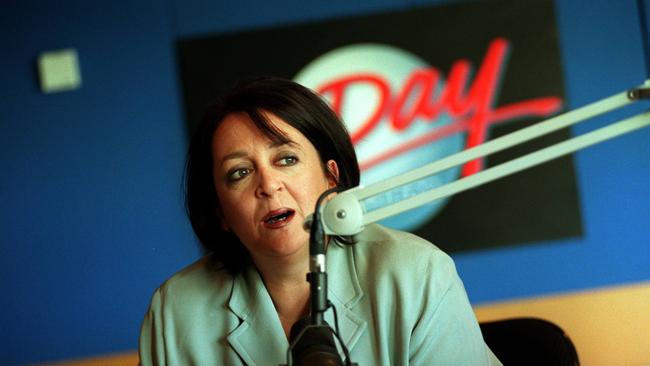
Fordham says despite the emergence of more advanced forms of content providers, radio has emerged as the ultimate survivor.
“It’s harder to kill than a cockroach,” says Fordham.
“It really is.
“When streaming came along, people still tune in and want to listen to music on the radio because they get a bit of a sense of what’s the weather like, what’s going on.
“And also it’s those other stories. When the Queen dies, when a famous person dies, people want to hear about what Amanda’s memories are of this person. With the internet and social media, that was supposed to kill off this business as well. But what happens is, with all of the misinformation and disinformation out there online, people now go, ‘no, unless I hear it from someone that I know and someone that I trust, I don’t believe it’.”
So for now, Jones, Keller and Fordham won’t be hitting snooze on their 3am alarms any time soon.
“You snooze you lose,” says Jones.
KYLE AND JACKIE O’S MIC DROP
AFTER 20 years on air together, no one speaks radio like KIIS FM’s Kyle and Jackie O.
Hotly contested radio ratings have the pair in the No. 1 spot for breakfast – and a growing generational audience shows the medium is not even close to slowing down, 10 decades on.
The controversial personalities have had a love-hate relationship, drifting apart when Jackie had daughter Kitty and “Kyle went through his break-up and went crazy”, according to Jackie. But in recent times, they’ve fiercely reconnected — and never more so than after the birth of Kyle’s now-one-year-old son, Otto.
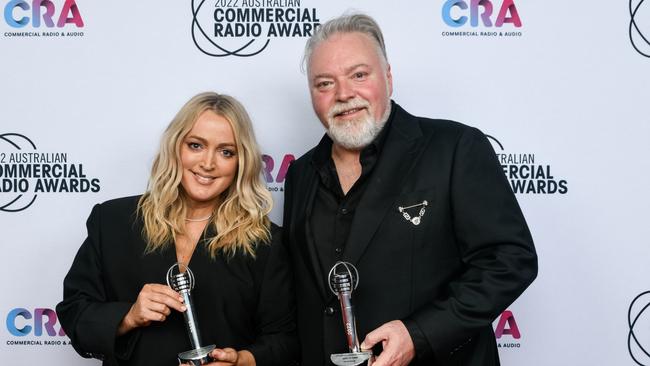
“I was a fan of Jackie’s before meeting her,” Kyle told Insider earlier this year.
“I was at another station up in Brisbane and when I got the chance to work with her, I was in shock, I was almost paralysed with fear — you know when you work with someone you admire, you can’t actually act normal? We’ve been there through both of our ups and downs — multiple Jackie’s relationships, divorces — and they seem to be never-ending, like a revolving door. But she’s been good for a while, she’s put that vagina on ice.”
Like “an annoying big brother”, Jackie admits Kyle is protective of his old friend.
“And I do think the audience loves how much Kyle has my back,” she says.
While they agree their diehard fans have aged with them, there’s also a new generation of listeners who have come along for the ride, securing their top position on the airwaves.
“What I have noticed, just from being out on the street and who comes up to you the most, I think we’ve got that audience that has stayed with us and grown up with us and are around the same age as us,” Jackie says.
“But what has really become prevalent in these last few years is their kids. So we grew our audience of 10 to 17-year-olds massively, because they’re in the car, and mum and dad are listening so they then become fans … and thank God that’s happening because it gives us both ends of the spectrum, and you can’t ask for more than that.”





